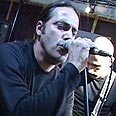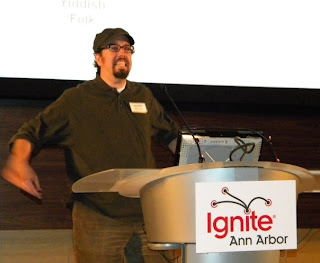 I love the clarinet. I have since I was in fourth grade and signed up to learn it in music class. I'd love to say I chose the clarinet because I was inspired by Dave Tarras or Naftule Brandwein but it isn't so. I picked it because, of the five or so instruments I could choose from, it was the only one I knew nothing about. This sealed my future career. Not as a clarinetist, sadly, but as a research scientist.
I love the clarinet. I have since I was in fourth grade and signed up to learn it in music class. I'd love to say I chose the clarinet because I was inspired by Dave Tarras or Naftule Brandwein but it isn't so. I picked it because, of the five or so instruments I could choose from, it was the only one I knew nothing about. This sealed my future career. Not as a clarinetist, sadly, but as a research scientist.David Krakauer plays the clarinet that way I wish I could (ok. I wish I could play at all, but bear with me). Klezmer clarinetists often have two modes, anguished wailing and hippity hoppity dancing. He goes way past that. He can can sputter, fret, laugh and yell. His moods on stage are tangible.
My wife and I saw him play tonight in Ann Arbor, Michigan, with his group Klezmer Madness (including Socalled). This was not straight up klezmer. The band instrumentation was much more like a rock band, with electric guitar and bass, drum kit, and Socalled's sequencer, in addition to accordion and Krakauer's clarinet. For me this was combo was perfect, but I'm not so sure everyone in the audience got it. It was a pretty grey haired crowd and even though the band kept the volume down, I saw some questioning faces. Oh well.
I thought Krakauer and the band were fabulous. Their opening songs set the tone of the show; the band would play ensemble and Krakauer would be flying solo in front and up an octave. But the band was given lots of time to shine. The drummer, Micheal Sarin, and the accordionist, Will Holshouser, each had their own compositions showcased. Trevor Dunn (bass) anchored out the groove and Sheryl Bailey (guitar) provided atmospherics and each had plenty of moments to shine. And Socalled was everywhere, bouncing from piano to sequencer to mic. His sound, beats, samples, and influence were everywhere.
My favorite moments were Krakauer and Socalled's arrangement of 'Rumania, Rumania' and Sarin's 'Waiting for Julian." Rumania, Rumania is is a Yiddish Theater classic written early enough in the 1900's for Eastern Europe in general, and Rumania in particular, to hold romantic nostalgia for recently emigrated Jews in New York. Krakauer's arrangement builds on the romantic longing of the original, but adds a post-Shoah and post-communism anger and frustration with what happened to Rumania and it's Jews.
Sarin's drum composition was an unexpected joy. One my brothers plays drums (much better than I played clarinet) and I've heard a lot of drum solos. This wasn't like anything I've heard. It was a fully realized composition, with Sarin using brushes, sticks, mallets and bare hands to pull themes and variations out of rhythm, dynamics and tone. I happily shelled out for a copy of the Klezmer Madness live cd just to (I hope) be able to hear that again (and again). I also grabbed their new album, Bubbemeises.
To sum up. I GOT TO GO SEE DAVID KRAKUER (and Socalled too!). Whee.








































